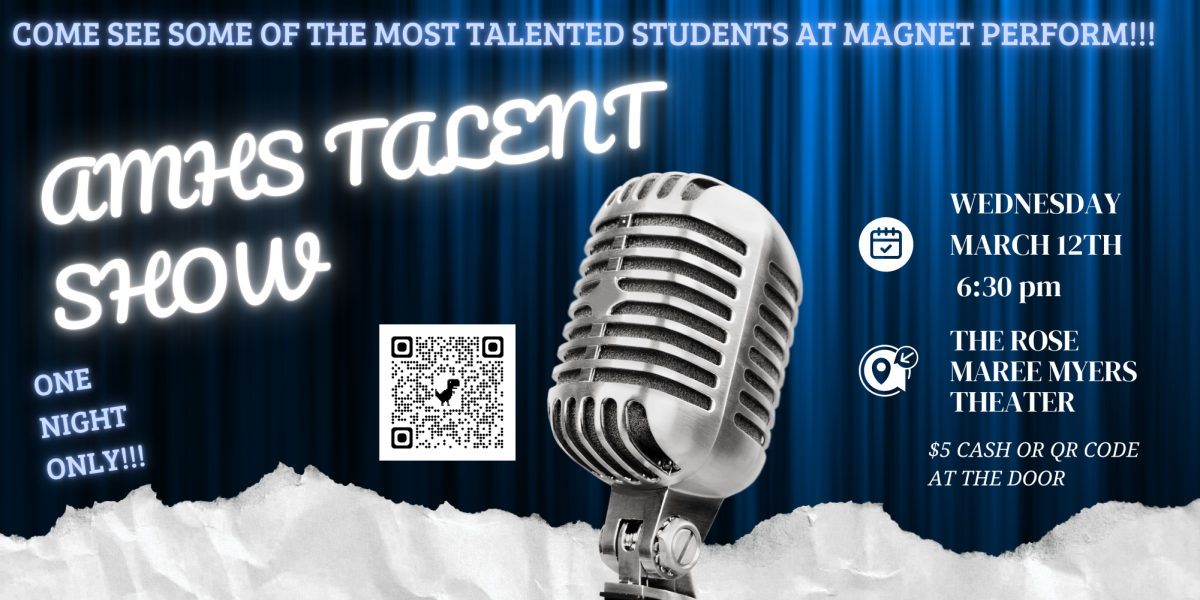Since the release of apps like Chat-GPT, AI usage in the school setting has increased tenfold. Students and teachers alike are divided by the ways it can be used in the classroom, from answering physics questions to writing essays, and the morals of using it on schoolwork. While some teachers are fully opposed, others are welcoming it – while some students adamantly refuse to go down the same routes as their peers and use AI for their homework. Here at Academic Magnet, our student body and teachers have a wide variety of opinions, and this article hopes to shed some light on the wide spectrum of beliefs at our school.
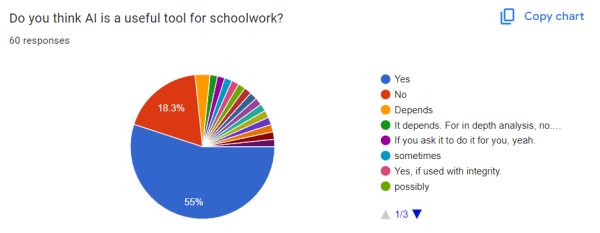
First off, the students are very opinionated on whether or not AI is actually a useful tool for schoolwork. A whopping 55% of responders voted an unequivocal “yes” when asked the above question, comprising 32 of the 60 responses. 5 other students responded with various statements supporting the usage of AI, including John Fletcher, who said, “AI can be a great tool for schoolwork when used wisely. It helps with research, writing assistance, language translation, math problem-solving, and even personalized learning. AI-powered tutors can provide instant explanations, while tools like grammar checkers and summarizers make writing more efficient.” However, he also acknowledges the fact that AI should be used as an aid for learning rather than a shortcut to a solution.
Only 18.3% of the respondents voted “no,” which comprised 11 total responses to the survey. Some of the other responses also voiced their disdain for AI, with Kyan Dushak saying, “It has the potential to be, but is usually misused,” and Elena Barber stating, “It could be for some people, but I don’t think it’s good in the long run.” A total of 13 out of the 60 respondents are against the usage of AI on schoolwork.
A number of other people were on the fence – multiple respondents left answers such as “sometimes” and “maybe,” contributing to a total of 9 people who either think it depends or consider AI in the classroom on a case by case basis. All in all, the AMHS student body leans heavily towards supporting the usage of AI in the classroom, with only a few people exhibiting discontent.
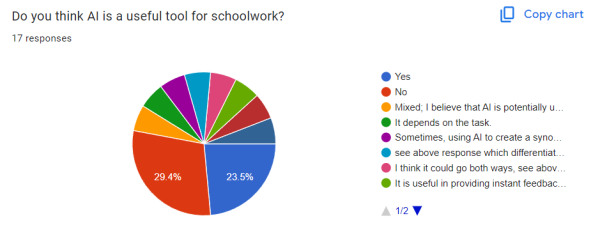
On the other hand, teachers seem to be evenly split on whether or not AI is useful in the classroom. The majority answer, with 6 total out of the 17 responses, was “no,” with some teachers supplementing their answers. Only 23.5% of surveyed teachers voted yes, and many of the teachers had answers that could not simply be explained by “yes” or “no.” Mr. Garris in particular had a mixed opinion on the subject, saying, “I believe that AI is potentially useful in certain situations, as a research aid and for certain types of content creation. I do not think that it is a healthy tool for completing written student assignments from scratch, as that removes the chance for the student to practice the writing process directly.”
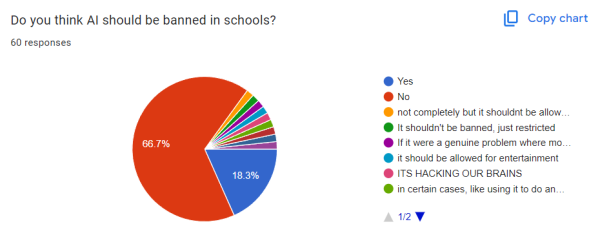
Back to the students, an overwhelming amount of respondents voted “no” to the prospect of banning AI in schools. 66.7% of the total respondents, approximately 39 out of 60, voted no without elaborating, while only 11 respondents (or 18.3%) voted yes. Most students agree that AI should not be banned in schools but simply restricted, and it should not be allowed on certain assignments like essays. Rashad Abbas thinks that “If it were a genuine problem where most people were just having it write the assignment for them then yeah, it should be banned.”
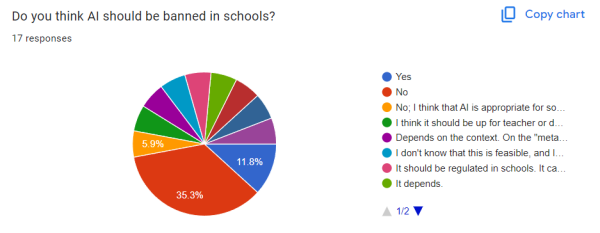
This may come as a surprise to most students, but many of the teachers were opposed to a ban on generative AI in the classroom as well. 35.3% of responding teachers voted against banning AI, with only 2 of the 17 teachers outright responding “yes.” Multiple teachers agree with the sentiment that AI is good for certain situations but not others, and Dr. Hay thinks its allowance should be up to either the teacher or their department. Ms. Desbrow says, “It should be regulated in schools. It can be useful to help teach a simple skill. This is similar to someone falling down and getting back up when learning how to walk. It can not be used to combine skills such as writing an essay or applying mathematics to a real world situation because that takes a complexity of thought that machines are currently incapable of.”
When students were asked what they personally thought of AI in the classroom, many of them responded quite positively. Statements such as “it’s good,” “it’s useful for understanding classwork,” and “it can help solve complex problems” were common throughout the 60 responses, with Keely Yagel saying, “AI should be permitted more because it is very helpful for specific problems if you do not understand something.” However, other students were very opposed, with Emelie Norton calling AI “mid” and Liam Hoer saying it is an “easy way to fail.”
The ways students would hypothetically use AI on their schoolwork varies greatly, from creating notes to checking their answers. Molly White claims she would use AI to help with math problems, while Machaela Black says she has used it to make study notes for her AP Euro exams. On the opposite end of the spectrum, many students say they have not used AI on their schoolwork at all and do not plan to do so in the future, with Emme Williamson saying, “I would not use AI at all, and I believe using it is unethical because of its massively negative environmental impact and the labor issues of AI writing/art.” Overall, most Magnet students do not want to use AI on their schoolwork for fear of being caught cheating or plagiarizing.
Teachers had some similar responses to being asked how they would use AI in their teaching materials, with Señora Colón mentioning AI podcasts that can be used as listening activities for foreign language classes. However, the majority of teachers were staunchly opposed to using AI in their learning materials – Mr. Flo in particular rejects using it and prefers properly vetted teaching materials so that he can ensure his students are learning with quality content. Mrs. Akery expressed a desire to design a unit for study hall classes that covers ethical, responsible use of AI, as she does not want AMHS students using it to do their writing and thinking for them.
Many of the responding teachers shared the same opinion on AI – that the rapid spread as well as the impact that it has on students is concerning, and it should not be outright banned but at the very least heavily restricted. While teachers such as Ms. Desbrow and Mrs. Beuk think that it could be a useful tool in some spaces, others like Mr. Phillips believe that the work AI could produce is nothing close to the quality of Magnet students’ work, and Mrs. Frazier believes that using AI to help with math problems without trying leaves students without proper problem solving skills. Ms. Vann’s response was particularly insightful, as she shed some light onto the true impacts that AI can have on our lives outside of education: “Education is the most powerful weapon to change the world according to Mandela. I hope you will not let AI take that away from you. I hope you will learn to express your true self on the page rather than allow a bot to fill your pages with soul-less, empty words that have no significance to anything real or tangible.”
As you can see, the Magnet populace has an extremely wide variety of opinions on the usage of AI in our classrooms. How do you feel about the ways AI is used? Would you benefit from a blanket ban, or would it only serve to your detriment? All of the above are questions to consider as we venture into an unknown future, marked by the uncertainty of the continued stability of our education system. One thing is for sure, though – no matter what, AI will never be able to take away our ability to voice our opinions.






